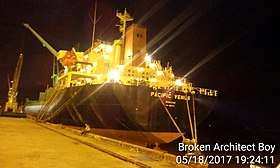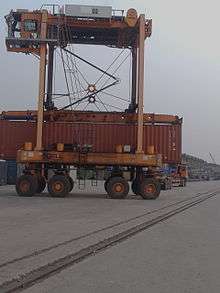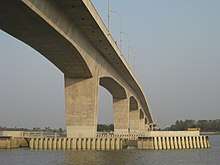Port of Mongla
The Port of Mongla is the second busiest seaport of Bangladesh. It is located in Bagerhat District in the southwestern part of the country; and lies 62 kilometres (39 mi) north of the Bay of Bengal coastline. Mongla is one of the major ports of the Bengal delta. Mongla is located 48 kilometres (30 mi) from the city of Khulna, which is a regional industrial center. Due to increasing congestion in Bangladesh's largest port in Chittagong, many international shipping companies have turned to Mongla as an alternative.[3]
| Port of Mongla | |
|---|---|
 A ship docked in Mongla | |

| |
| Location | |
| Country | Bangladesh |
| Location | Mongla Upazila Bagerhat District, Khulna Division |
| Coordinates | 22°29′20″N 89°35′43″E |
| UN/LOCODE | BGMGL[1] |
| Details | |
| Opened | 1950 |
| Operated by | Mongla Port Authority |
| Owned by | Government of Bangladesh |
| Type of harbor | Artificial / Natural |
| Available berths | 11 |
| Statistics | |
| Annual container volume | 70,000 TEUs[2] |
| Website mpa | |
Mongla is a gateway for tourist ships traveling to two UNESCO World Heritage Sites in the region, including the Sundarbans and the Mosque City of Bagerhat. The port also hosts the Mongla Export Processing Zone (Mongla EPZ).
History

The port was founded in 1950 to serve the southwestern region of East Bengal. It was originally known as Chalna Port.[4]
Geography
It was formerly located at Chalna, about 18 kilometres (11 mi) upstream on the Pasur River but it is now located 48 km south of Khulna city, as established on 11 December 1954. The Port is surrounded and protected by the Sundarban mangrove forest.[5] The port is situated at the confluence of the Pasur River and the Mongla River. It lies about 100 km (62 mi) north of the Bay of Bengal.
Port infrastructure
The port has 11 jetties and 8 warehouses. It uses 12 swinging moorings in deeper sections in the river. The port is connected by the Bangladesh Railway to the Khulna Metropolitan Area.
Ship services
In 2015-16, 636 ships used Mongla port.[6] Mongla is connected to most major ports in the world, particularly Asian ports. Hundreds of ships use the port each year, most of which come via Singapore, Hong Kong and Colombo. Mongla is also connected to most inland ports in Bangladesh, including the Port of Dhaka and the Port of Narayanganj.
Following a coastal shipping agreement with India, Mongla has a direct shipping route with the Port of Kolkata in the neighbouring Indian state of West Bengal. A coastal shipping agreement has also been signed with Thailand.[7][8]
Trade

The port is open for 24 hours and up to 225 metre long ships can enter into the port for discharging cargo. A constraint free large channel is available for anchorage and loading/unloading facilities on both sides for 33 ships at a time.
Future expansion
The government of Bangladesh has launched dredging and jetty construction projects to expand the capacity of Mongla port.[6][9]
References
- "UNLOCODE (BG) - BANGLADESH". service.unece.org. Retrieved 22 April 2020.
- http://www.thedailystar.net/business/mongla-not-fit-take-heat-ctg-port-1442713
- "Bangladesh port expands as shippers avoid Chittagong". Joc.com. 5 June 2012. Retrieved 24 July 2017.
- "Mongla Port - Banglapedia". En.banglapedia.org. Retrieved 24 July 2017.
- Mongla Port Authority - Other Information Archived 28 March 2012 at the Wayback Machine
- "Mongla port capacity expanding". En.prothom-alo.com. Archived from the original on 14 August 2017. Retrieved 24 July 2017.
- G. Padmaja (21 June 2016). "Coastal Shipping Could Propel Ties Between India and Bangladesh - The Wire". Thewire.in. Retrieved 24 July 2017.
- Reuters Editorial (9 February 2016). "Bangladesh-Thailand trade to quadruple with direct shipping links". Reuters. Retrieved 24 July 2017.
- "Bangladesh: Plan for Mongla Port Development Project Unveiled". Dredging Today. 4 July 2010. Retrieved 24 July 2017.